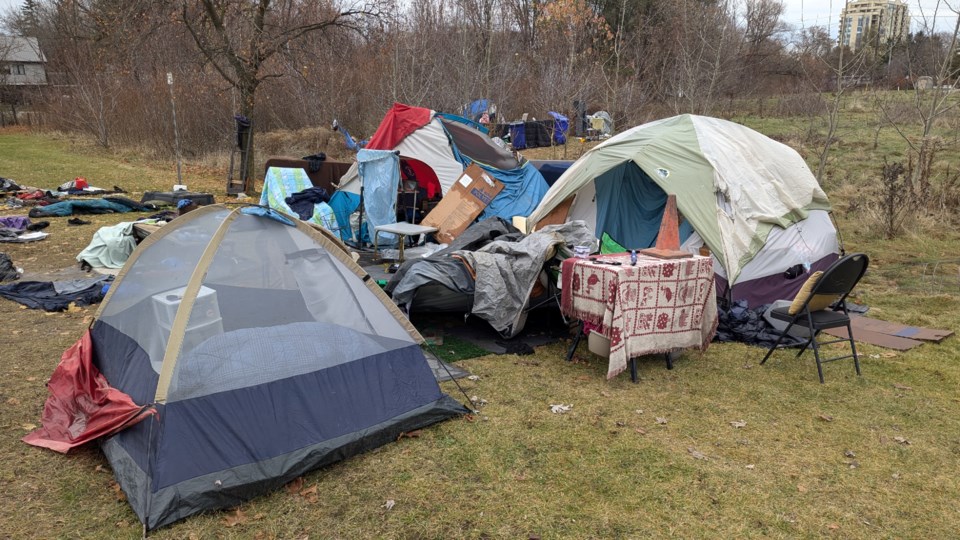Barrie Mayor Alex Nuttall continues to stand behind proposed new laws which the province says will better deal with homeless encampments and illegal drug use on public property.
“These new laws give us the tools we need to get tough on those who break the law and will help us to keep our community safe,” Nuttall said Dec. 19, answering a series of email questions from BarrieToday, an affiliate of BradfordToday and InnisfilToday.
The Ontario government introduced legislation Dec. 12 designed, if passed, to better protect community safety by providing municipalities and police with new resources and enforcement tools, to address the growing problem of homeless encampments and crack down on illegal drug use in parks and public spaces.
To help clear parks and public spaces of encampments, the Safer Municipalities Act, 2024 includes amendments to the Trespass to Property Act, which applies to private business, offices, stores, hotels, parks and vacant land.
These amendments, if passed, the province says, will enhance penalties for people who deliberately and continually break the law by adding the new aggravating factors of continuous trespassing and the likelihood to reoffend.
In cases where these factors are present, these new tools would be applied by the court during sentencing.
The Conservative government says it is further protecting communities by introducing the Restricting Public Consumption of Illegal Substances Act, 2024 that would, if passed, allow police officers and other provincial offences officers to direct individuals to stop using illegal substances or to leave the public space.
This would allow these officers to issue a ticket or arrest someone who does not comply, providing what the province calls an important additional tool to stop the consumption of illegal drugs in public spaces. People found guilty of violating this legislation, including those doing so in encampments, could face fines of up to $10,000 or as long as six months in prison.
“We welcome these changes from the province to crack down on illegal drug use in parks and public spaces,” Nuttall said. “Our children have a right to feel safe when playing in our parks and playgrounds.”
As part of the province’s focus on long-term treatment and recovery, it says, the government is also exploring new judicial approaches that provide the option of rehabilitation as an alternative to incarceration in the event of minor or non-violent drug crimes.
Nuttall said Barrie will continue to work closely with the County of Simcoe, which leads homelessness supports and services in the city.
“The County of Simcoe is responsible for planning, funding and managing local homelessness prevention service delivery, poverty reduction initiatives and shelter retention programs,” Nuttall said.
Ontario Premier Doug Ford has said he was willing to use the legislative tool known as the notwithstanding clause to override the Canadian Charter of Rights and Freedoms "should the courts interfere" in municipalities using the proposed new laws.
In January 2023, an Ontario Superior Court justice ruled that Waterloo Region could not use a municipal bylaw to evict people living in an encampment in Kitchener — because that bylaw violated the Charter. The judge said a lack of shelter spaces means the bylaw infringed upon Charter rights.
The legislation comes after public requests by more than a dozen Ontario mayors, including Nuttall, to strengthen involuntary addiction treatment laws and have the province become an intervener in court cases where municipalities are looking to clear encampments. The mayors also asked for certain laws to be strengthened to allow for arrests and jail time for those who repeatedly trespass.
Ontario is also investing $75.5 million to further support homelessness prevention and provide people living in encampments with access to reasonable alternative accommodation. This is in addition to the province’s ongoing $700 million investment in homelessness prevention programs each year, as well as the $378 million the province is investing in 19 Homelessness and Addiction Recovery Treatment (HART) Hubs.
“Encampments are a public safety concern and not a solution to homelessness,” said Paul Calandra, Ontario’s minister of municipal affairs and housing, on De. 12. “We are ready to provide more funding for those municipalities that show results in winding down these sites so they can address the specific needs of people in encampments and quickly move them from crisis into safer accommodation and ultimately stable, long-term housing.”
Nuttall did not answer a BarrieToday question on how the city would use this funding, and what the level of funding would be, if received by the city.
The mayor also did not answer questions asking what the city’s plans are to implement these new laws, if passed, and to apply them to the encampments in Barrie.
Would it all be done by city police, would it be city employees or would the city use contract workers also remained unanswered.
— With files from The Canadian Press



